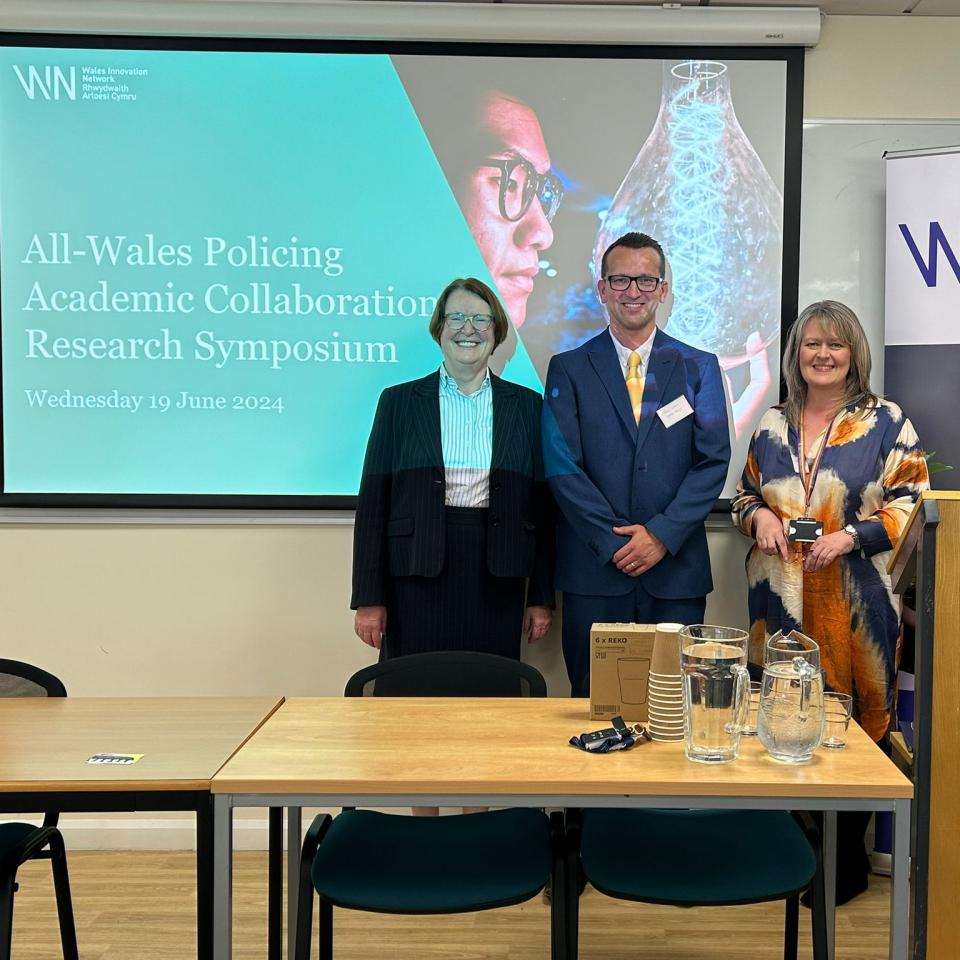
Symposium highlights Welsh police-university research collaboration
Representatives from academia and policing across Wales gathered on 19 June at the All-Wales Policing Academic Collaboration (AWPAC) Research Symposium to discuss the collaborative research conducted through AWPAC.
20 June 2024
Established in 2022, the All-Wales Policing Academic Collaboration is a collaborative network for policing research in Wales, bringing together researchers from across Wales to address key challenges and work collaboratively to help improve policing in Wales. It brings together the four Welsh police forces, the offices of the four Police and Crime Commissioners, and Wales’ nine universities, with support from the Wales Innovation Network (WIN).
Over the past two years, AWPAC has provided small grant funding to eight projects to address some of the key challenges in policing. The outcomes and findings of each of the funded projects were presented at the symposium.
One such project supported by AWPAC is the All-Wales data sharing project. Highlighting the collaborative nature of AWPAC, it brings together academics from four Welsh universities and police analysts from all four Welsh police force areas in an effort to merge Welsh police force data with the SAIL databank, which holds a wealth of population data that helps to answer research questions. This important data would support a wide variety of research to inform police practices.
Another project has supported police force representatives from across Wales to work with academics in exploring how Welsh forces are addressing domestic abuse and violence within the police. Findings from a pilot service, Tabw, providing emotional support and advocacy for survivors of violence against women, domestic abuse and sexual violence committed by police, will assist key services across Wales to improve their work with survivors.
Speaking at the symposium, Professor Elwen Evans KC, Vice-Chancellor of the University of Wales Trinity Saint David, said:
“The All-Wales Policing Academic Collaboration is a great example of the impact joint working can have. It is encouraging to see so many excellent projects receive funding through this network over the last two years where police forces and universities across Wales have collaborated to address key challenges and inform policies. I'm delighted to have the opportunity to support this research symposium and I look forward to all that AWPAC will continue to do into the future.”
Superintendent Ross Evans, Dyfed-Powys Police Force, co-chair of AWPAC, said:
“AWPAC is a vital platform for exchanging knowledge and ideas that can transform policing. By bringing together academics and police, we can develop strategies that are both innovative and practical. The insights gained from academic research directly influence our policies and practices, ensuring that we are equipped to face current and future challenges.”
Professor Deborah Jones, Swansea University, co-chair of AWPAC, said:
“The All-Wales Policing Academic Collaboration has developed a model of working between universities and all four police forces across Wales that supports trust and confidence in policing through evidence based, collaborative approaches. I am delighted that we could celebrate the success of AWPAC through this research symposium, highlighting the excellent initiatives that have been funded over the last two years.”
If you would like any further information on any of the AWPAC funded projects, please contact innovation.network@uniswales.ac.uk.
Year 1 projects:
- All-Wales data sharing project: Dr Gwyn Griffith, Aberystwyth University
- Effects of national media coverage on local trust and confidence: Professor Stefan Machura, Bangor University
- Police understanding and application of the concept of vulnerability in responding to the needs of sex workers in Wales: Dr Jordan Dawson, Swansea University
- Enabling and blockers to student volunteering in policing: Bronwen Williams, University of Wales Trinity Saint David
- Addressing domestic abuse within the police – exploring Welsh police forces’ response to victims and offenders as employees
Year 2 projects:
- Addressing police perpetrated VAWDASV: A process evaluation (continuation of Year 1 project): Dr Sarah Wallace, University of South Wales
- Operation Diogel and specialist units for tackling VAWG across Wales: Dr Bethan Davies, Cardiff University
- Misogyny as a risk factor leading to serious harm in cases of domestic abuse: Claire Hodgkinson, Bangor University
